Upper vs Lower Antelope Canyon – which one if better? After spending COUNTLESS hours researching which one to visit, we decided to go to both – and here we’ll help you decide which tour is better!
We are all for travelling off the beaten path. However, sometimes, there’s a reason why famous sights attract lots of visitors, so many in fact that complex admission systems are put in place to manage the visitor influx – because they’re beautiful.
This is the case of Antelope Canyon, one of the best known sights in the Navajo Nation, not far from Monument Valley. I bet anyone who’s seen an image of it has wanted to visit – and naturally, we did, too.
I bet many people don’t know that there’s actually TWO separate Antelope Canyons – Upper and Lower, which are actually quite different in terms of looks and experiences.
Naturally, you can visit both Upper and Lower Antelope Canyon – but most people tend to only opt for one. So, we’ve decided to do the groundwork for you and visit both.
There’s no single answer to which is better between Lower and Upper Antelope Canyon. Both slot canyons have their pros and cons – read on to find out about them both, plus lots of practical info and tips about how to visit Antelope Canyon!
Would you like to know more about US National Parks? Check these articles!
- Zion National Park in Winter
- 10 Things to do in White Sands National Park, NM
- Visiting Monument Valley in Winter
- Bryce Canyon in Winter
- Guide to Big Bend National Park, TX

Where is Antelope Canyon?
Both Lower and Upper Antelope Canyon are located in the LeChee Chapter of the Navajo Nation in Arizona, about 5 miles out of Page.
Both canyons are located on Navajo-owned lands, and in both cases, it’s compulsory to visit the canyons with a Navajo guide.
If end up with a great guide like we did at Lower Antelope Canyon, this will really make your experience unforgettable – our guide shared stories of his childhood in the area, and how it has changed since the arrival of tourists.
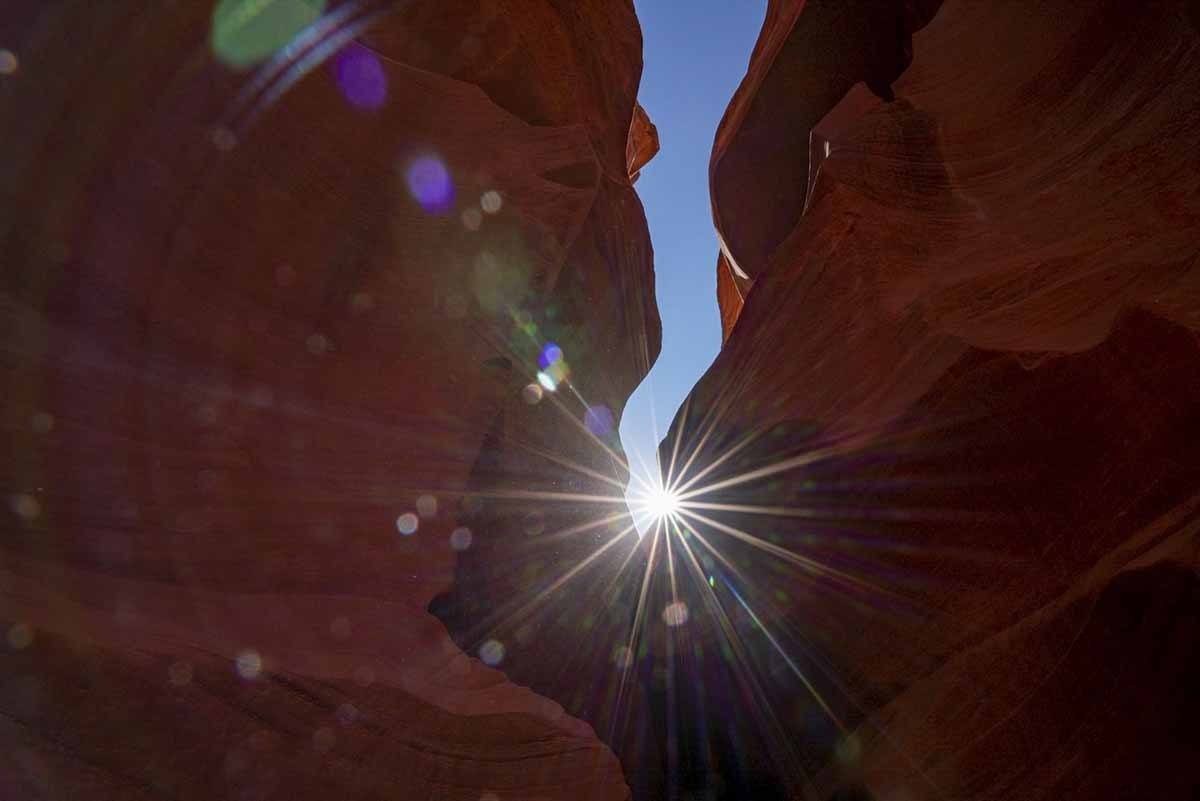
Difference Between Upper and Lower Antelope Canyon
At first glance, Upper and Lower Canyon look similar – two sandstone slot canyons, with waves and rock formation created by the action of wind and water through the centuries.
Looking closely, you’ll notice the two canyons have a very different shape – Upper Antelope Canyon is shaped like an A, narrow at the top and wider at the bottom, creating the light beam effect that made its famous.
Lower Antelope Canyon is the opposite – it has a V shape, wide at the top and narrow at the bottom. It’s also a bit trickier to get around, with really narrow passages and the need to climb some stairs.
Let’s have a look at Upper vs Lower Antelope Canyon in detail!
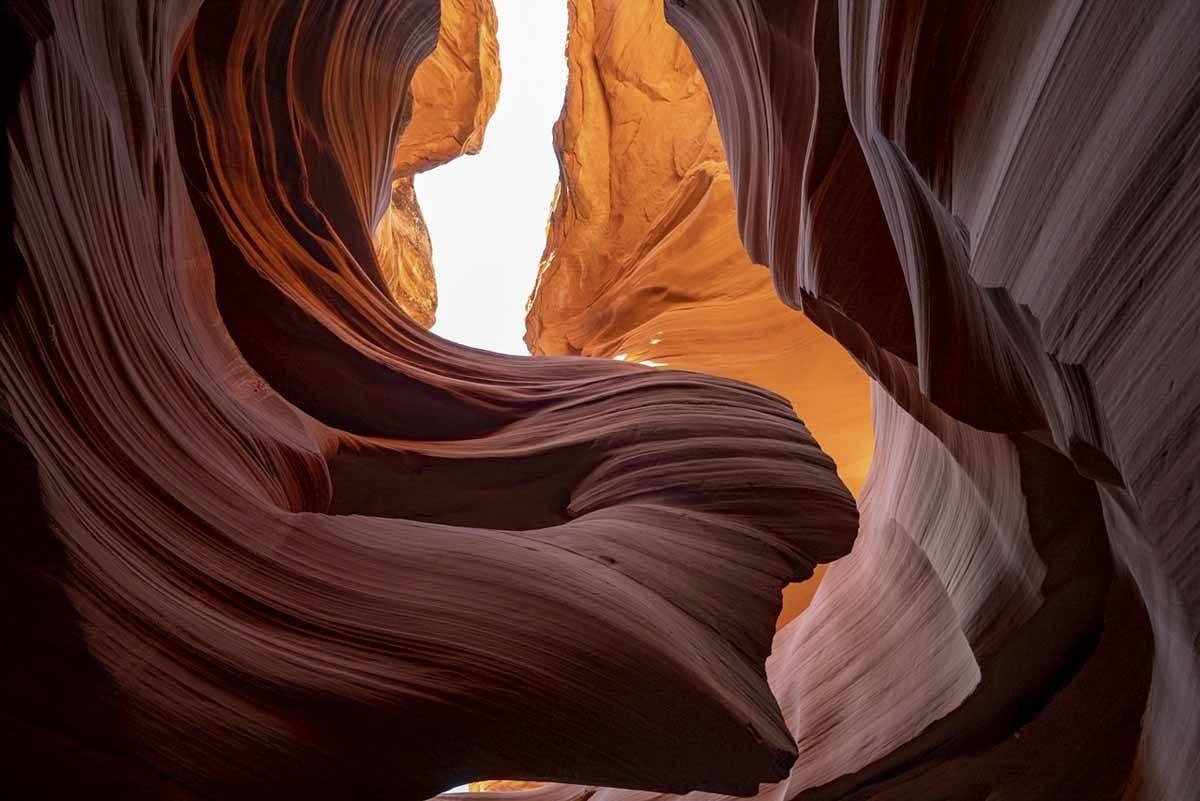
What to see in Upper Antelope Canyon
Upper Antelope Canyon is THE Antelope Canyon, the one made famous by Windows 7 screen savers, millions of Instagram pictures, and also the subject of the world’s most expensive photo ever sold.
The main reason to visit Upper Antelope Canyon is to see the iconic light beams and cascading sand effects, making for some truly spectacular pictures.
You’ll also see incredible formations and shapes in the sandstone walls, and see up close how the action of wind and water created the canyon – but this is something you can also see at Lower Antelope Canyon.
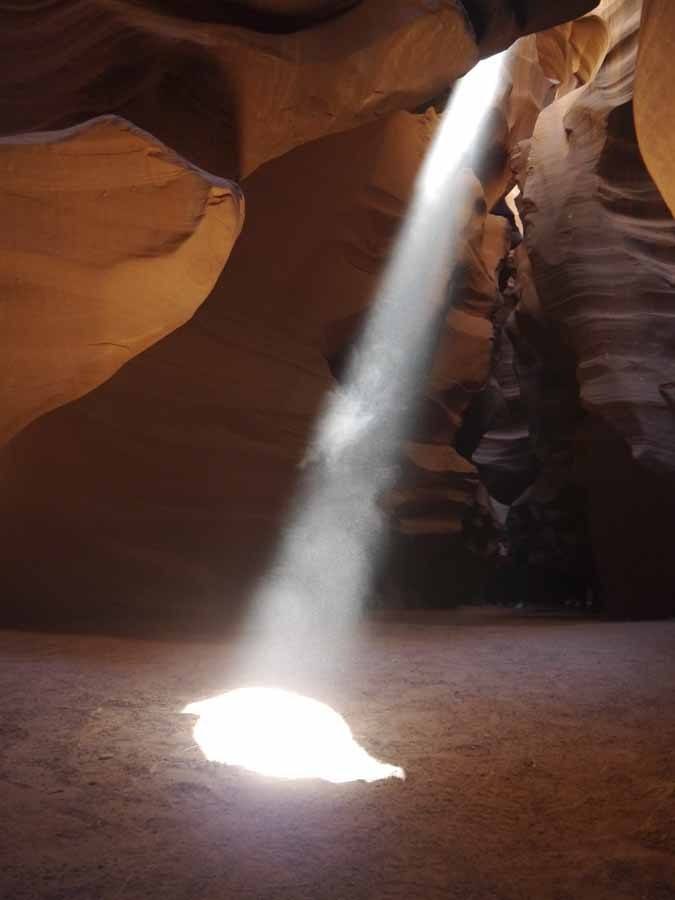
Upper Antelope Canyon Pros
-It’s More Photogenic
Remember how I said that when people talk about Antelope Canyon, they usually refer to Upper? That is because Upper Antelope Canyon is the more photogenic of the two, creating eerie light effects thanks to its A shape.
-It’s The One with Light Beams
Are you visiting Antelope Canyon because you want some pictures of the iconic light beams? Then, head straight to Upper – but make sure you’re visiting between March and November, and book a ‘prime time’ tour between 11 am and 1 pm, when the sun is close to its zenith – making it easier to create light beams.
Needless to say, if you’re visiting on a cloudy day, there will be no light beams – but luckily, Arizona is a sunny place! In winter you’re also less likely to see them.
Upper Antelope Canyon is also frequently visited to take pictures of ‘cascading sand’. Bear in mind that this is not a natural phenomenon, but a photo opportunity created by guides by placing handfuls of sand on the edge of a sloping rock.
-There are No Stairs
Upper Antelope Canyon is also the best option for people with mobility problems, since the canyon bottom is wide and sandy and there’s little to no walking involved to reach the canyon itself.

Upper Antelope Canyon Cons
-It’s More Expensive
Since it’s the most popular option, Upper Antelope Canyon is also considerably more expensive than Lower.
I’ll list all tour options down below with relative prices (updated to 2020) but to give you an idea, a prime time Upper Antelope Canyon tour is about $80-100 including taxes, whereas you can visit Lower Antelope Canyon for about half that.
-It’s More Crowded
Everybody wants that iconic light beam picture for the ‘gram, right?
Upper Antelope Canyon is considerably more crowded compared to Lower – when we visited in winter it wasn’t too bad, but friends visiting in summer reported that they felt ‘herded around’ with little or no time to enjoy the sights.
-The Tour is Shorter
Upper Antelope Canyon is also about half as long as Lower Antelope Canyon – about 600 ft (200 meters) vs 1335 ft (430 meters). Tours last about an hour and a half, but this includes transportation to the canyon and back – you end up spending less than an hour into the actual canyon.
-You Need to Book in Advance
Upper Antelope Canyon is the better known and more photogenic option, which means tours are almost always fully booked. If you are visiting in summer and hope to visit at ‘prime time’ (i.e. between 11 am and 1 pm) to see the light beams, you’ll have to reserve your spot several months before.
Off season, you can get away with booking a few weeks in advance – we booked our Upper Antelope Canyon tour about 3 weeks before our visit, and got one of the last spots available.
If you’re a spontaneous traveller, or you’ve left planning too late, fear not – Lower Antelope Canyon is just as beautiful, even without light beams!
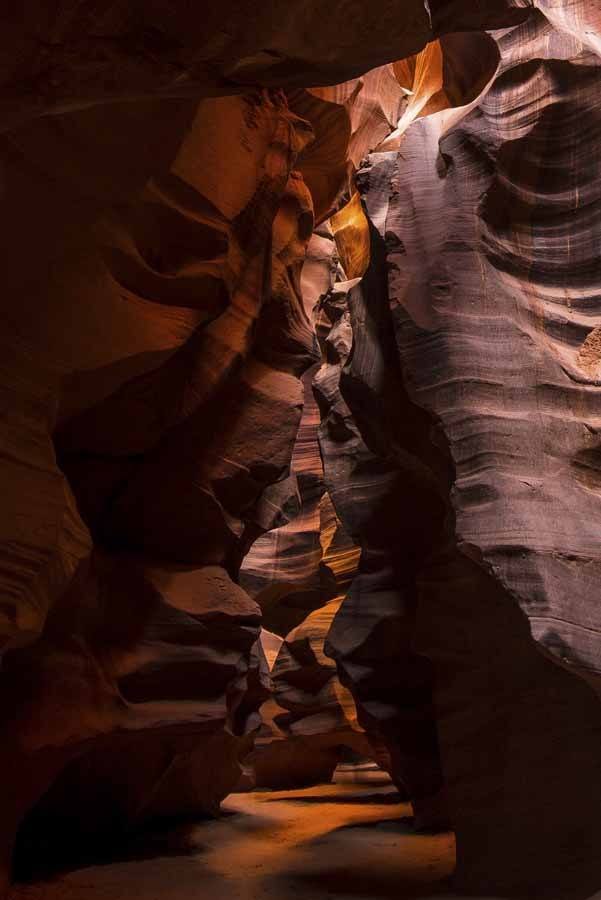
Upper Antelope Canyon Tours
The following companies offer Upper Antelope Canyon tours:
- Antelope Canyon Tours – $69 for ‘prime time’ tour at 11.30 am, $54 for any other time
- Adventurous Antelope Canyon – $151 for a 2 hour photography tour, $58 for for ‘prime time’ tour at 11.30 am, $54 for any other time
- Antelope Canyon Navajo Tours – $80 adult, walk in only for prime time tours
- Antelope Slot Canyon Tours by Chief Tsosie – $69 for ‘prime time’ tours at 10.30 and 11.30 am, $54 for any other time
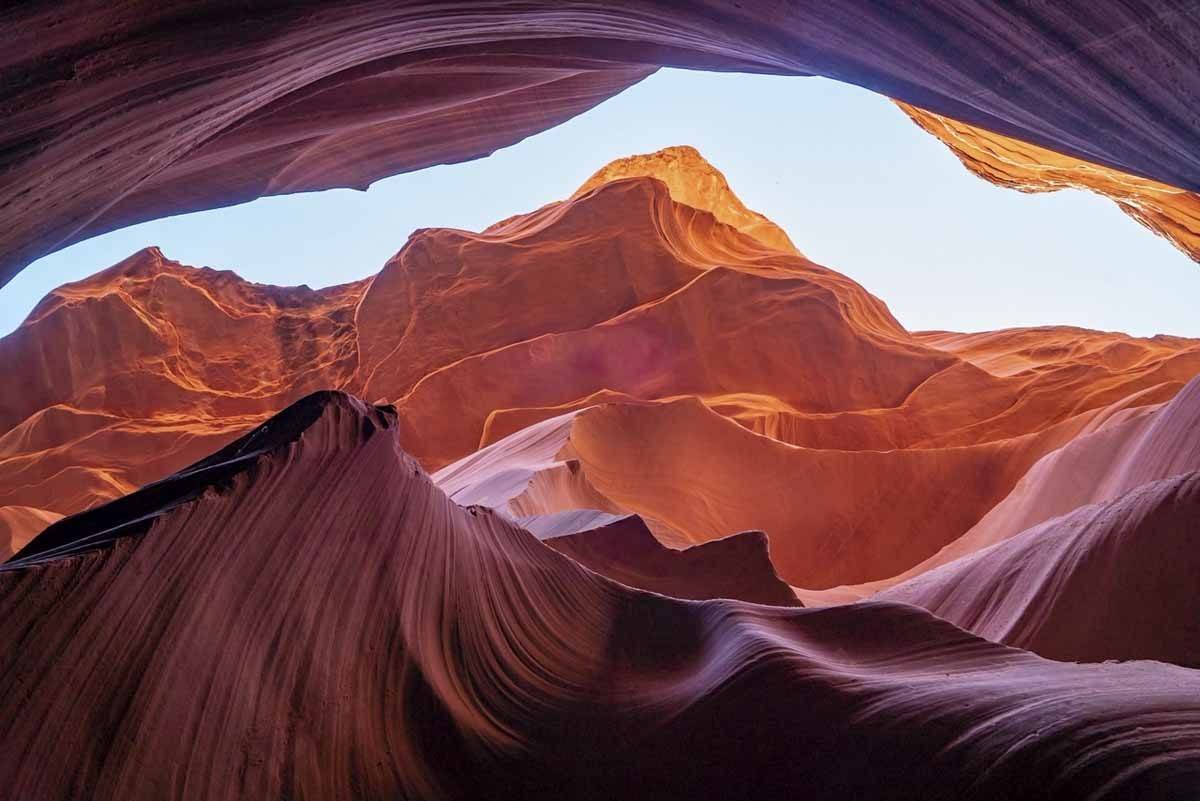
What to see in Lower Antelope Canyon
It’s unfair to refer to Lower Antelope Canyon as ‘an alternative’ to Upper. True, it doesn’t have light beams – but in my opinion, it’s actually nicer, and a much more pleasant experience to visit.
Remember that Lower Antelope Canyon is ‘V’ shaped? This means that the canyon is brighter, and the sunlight hitting the wall created beautiful light effects on the wave-like sandstone formations. Let’s have a look at pros and cons!
Lower Antelope Canyon Pros
-It’s Longer
Lower Antelope Canyon is double the length of Upper, at 1335 ft (430 meters) vs 600 ft (200 meters). Tours last about 1.5 hour, same as Upper Antelope Canyon tours, but since they start only steps away from the ticket office, you’ll spend more time into the canyon itself!
-It’s Cheaper and Less Crowded
Lower Antelope Canyon is a better option for budget-minded travellers, since tours are quite a bit cheaper compared with Upper tours.
To make matters even better, Upper Antelope Canyon is also less crowded, and you can usually take your time and actually enjoy the place – if you visit off-season, that is.
Bear in mind that the pace is often brisk since tour operators are on a strict time schedule to avoid overcrowding!

-It’s the Canyon with Ladders
Lower Antelope Canyon is ideal for adventurous-minded travellers! The narrow bottom of the canyon due to its V-shape means you sometimes have to squeeze through narrow passages, climb over rocks and ladders.
Generally speaking, visiting Lower Antelope Canyon feels more like a hike, whereas the Upper tour is just a short walk.
Having said that, tours to Lower Antelope Canyon are 100% safe – we got a clear briefing beforehand on how to behave in the canyon and on the staircases to get in and out.
Our group included some older travellers in their 70s, so don’t think it’s going to be ‘too much’ for you – if you are in good physical conditions and can walk unaided for an hour and a half, you can totally visit Lower Antelope Canyon!
-There’s No Need to Book Months in Advance
Now, don’t get me wrong – you can’t just rock up in the middle of high season and book a Lower Antelope Canyon tour on the spot.
You may be able to get walk-in tickets in low season, but it’s still better to reserve your tour in advance – a week or so before your visit in low season should be ok, and maybe a month or two in high season.
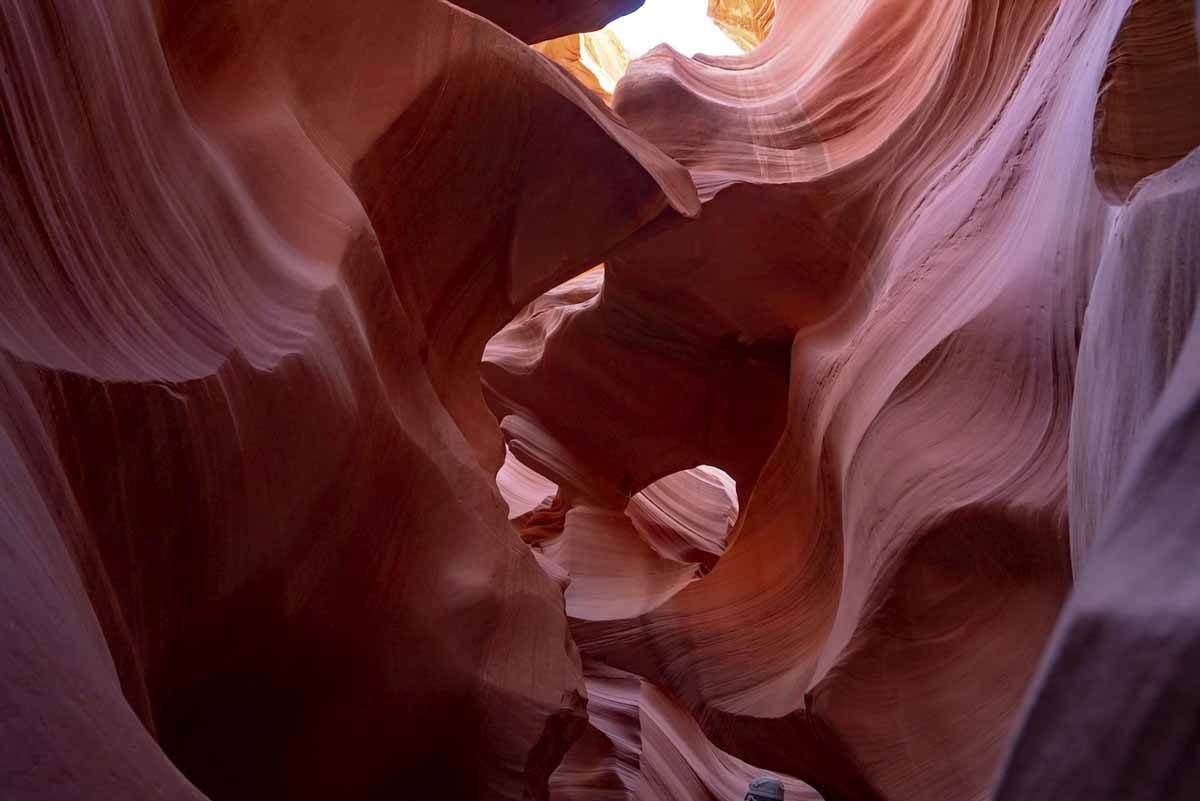
Lower Antelope Canyon Cons
-There are No Light Beams
As our guide eloquently said, ‘Upper Antelope Canyon has the light beams, Lower Antelope Canyon has everything else’. Enough said!
-There are Stairs and It’s Quite Narrow
I guess this can be considered both as a benefit and a drawback, depending on what you’re looking for. Visiting Lower Antelope Canyon means you’ll have to climb and descend staircases, squeeze through narrow passages, and watch your step at all times.
Are you adventurous? Great – you’ll love Lower Antelope Canyon. Do you have mobility issues? Maybe opt for Upper Antelope Canyon instead!
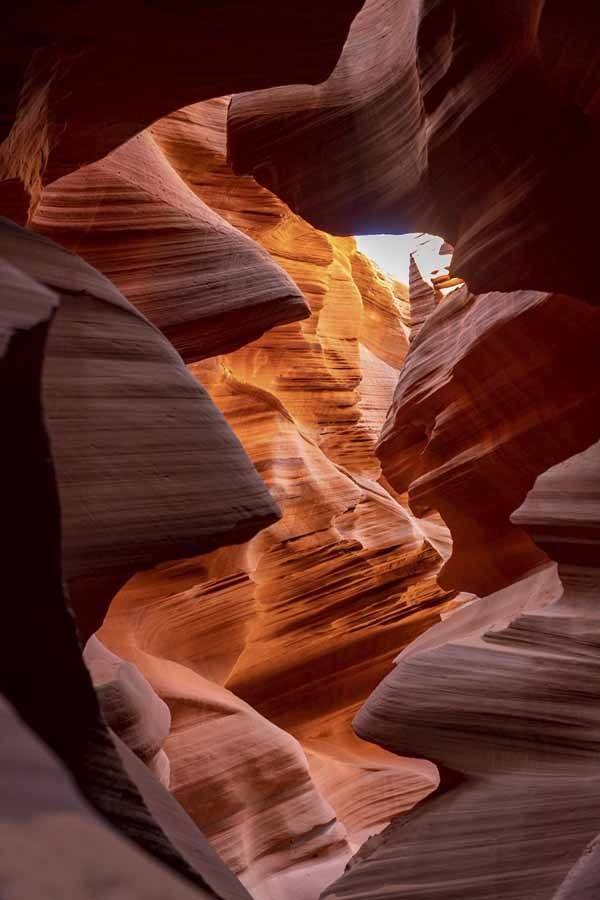
Upper Antelope Canyon Tours
- Ken’s Tours- Lower Antelope Canyon – $40 for the regular tour (max 10 people), $80 for the deluxe tour (max 4 people)
- Dixie Ellis’ Lower Antelope Canyon – $40 for adults – we went with this company and had a wonderful guide called Danny, highly recommended!
Upper Vs Lower Antelope Canyon – The Verdict!
All in all, both Upper and Lower Antelope Canyon are worth visiting – however, given that tours are likely to cost a minimum of $50/60 with taxes and tips, most people will want to choose between the two.
Our pick would be Lower Antelope Canyon. Not only did we have a wonderful guide, we also thought that the experience was overall more enjoyable. The pace was slower, we spent more time in the canyon and were able to move at our own pace, but we did visit during low season, so peak times may be different.
Since our visit was in winter, we couldn’t see the big light beam effects that Upper Antelope Canyon is famous for. The tour was much shorter, and the guide seemed less passionate – but it’s still a beautiful place.
To sum up, if you are visiting Antelope Canyon just for pictures, then definitely head to Upper for one of the prime time tours, between March and November.
Otherwise, opt for Lower Antelope Canyon – you won’t regret it!
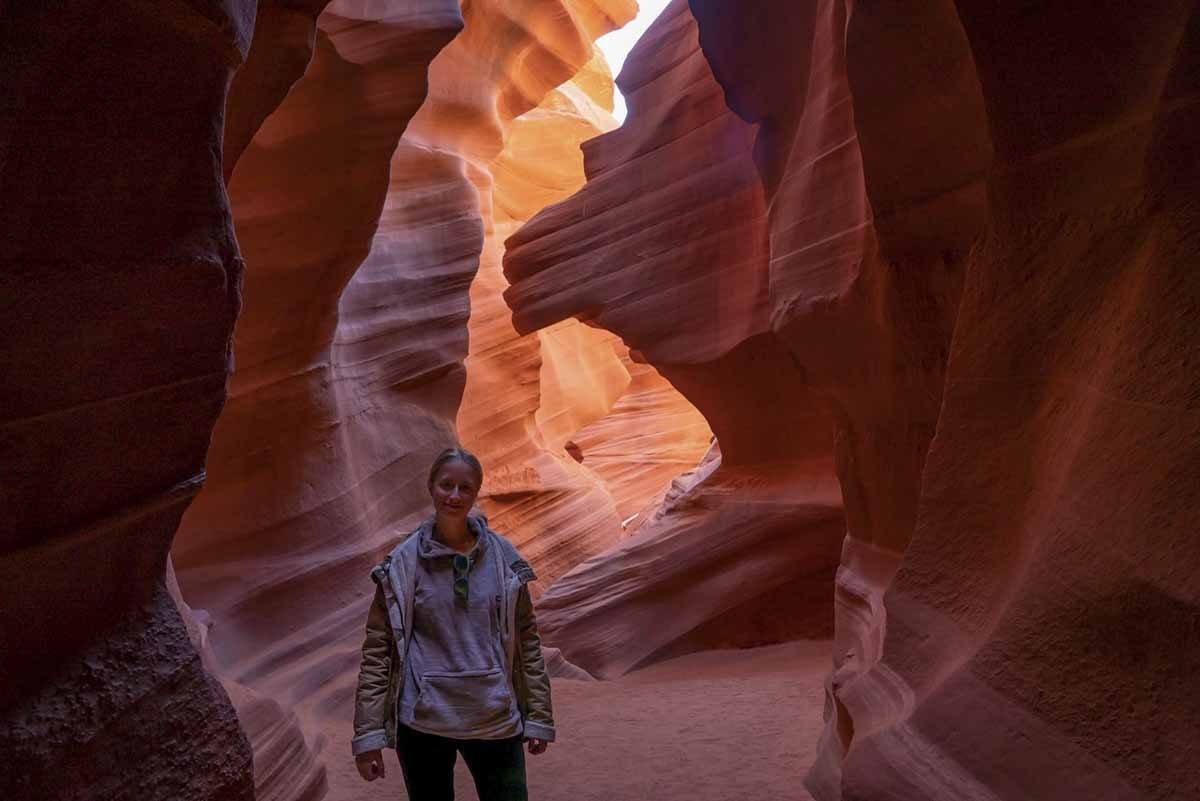
Lower vs Upper Antelope Canyon FAQ
Can You Go on a Self Guided Tour of Upper and Lower Antelope Canyon?
No, you can’t. Access is only allowed with a Navajo guide from one of the authorised operators listed above. This is because Antelope Canyon is on Navajo land, and because of the high likelihood of flash floods, which may hit in a matter of minutes.
Don’t try to be smart and trespass to save a few bucks. Not only is it disrespectful, it’s also illegal and very dangerous.
Can You See Upper and Lower Antelope Canyon in the Same Day?
You definitely can. Both canyons are located within 15 minutes from Page, and since tours only last about 1.5 hours, you can easily plan to visit Upper for one of the prime time tours, and visit Lower before or after.
It will be a very expensive day, setting you back about $150 for the two tours, not including tips – if you’re prepared to spend that much, then do it!
What’s the Best Time to Visit Upper and Lower Antelope Canyon?
To be honest, there’s no single answer to this question. Are you planning to visit Antelope Canyon to see the light beams and take dreamy pictures for your Insta? Then, your best bet would be visiting Upper Antelope Canyon between March and October, book a prime time tour, and pray for sunshine.
Otherwise, we recommend visiting Lower Antelope Canyon in the off season – between November and February. You’ll see no light beams, but you’ll be able to visit this natural wonder without having to jostle with the crowds, which will make your trip to this natural wonder really one to remember.
